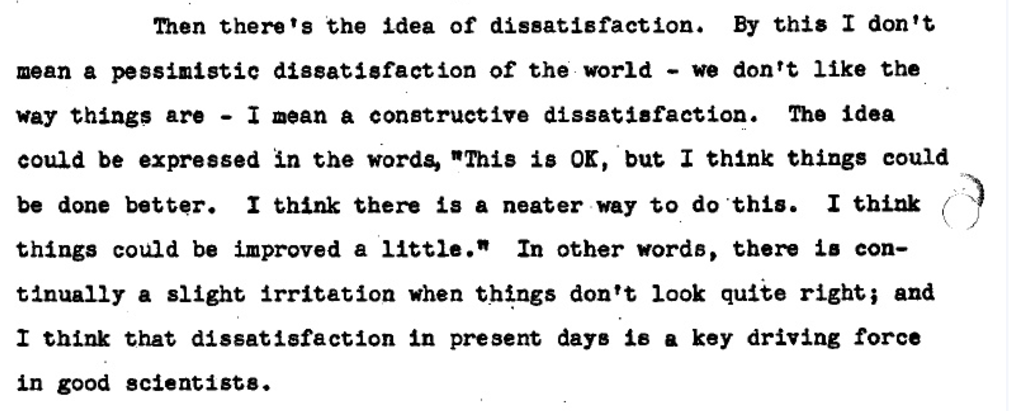That’s the classical etymological origin of the word cynic. Today most people define cynicism as an attitude or state of mind characterized by a general distrust of others’ motives.1https://en.wikipedia.org/wiki/Cynicism_(contemporary).
And if you spend much time paying attention to current events, a cynical posture is pervasive. If you spend anytime on Twitter or other social media, it’s almost all-encompassing. Particularly when it comes to politics, law, and government.2And to be fair, could President Trump make it any easier?!
I’m as guilty of cynicism as anyone, probably more so. I mean, in my Twitter bio I self-describe as “snarky.” Which isn’t that surprising really. I’m a lawyer and lawyers are trained to be skeptics.
To that point, while research indicates most people tend to look on the bright side of things, lawyers don’t – Except in One Career, Our Brains Seem Built for Optimism
All in all, Dr. Seligman said, optimists tend to do better in life than their talents alone might suggest.
Except lawyers.
Surveying law students at the University of Virginia, he found that pessimists got better grades, were more likely to make law review and, upon graduation, received better job offers.
“In law,” he said, “pessimism is considered prudence.”
Lawyers train in deconstruction and analysis. To look for weaknesses in arguments and exploit them. For lawyers, it’s prudent to be skeptical. It’s prudent to be pessimistic. But is it prudent to be cynical?
Developing Cynicism For Growth
Diogenes was knee deep in a stream washing vegetables. Coming up to him, Plato said, “My good Diogenes, if you knew how to pay court to kings, you wouldn’t have to wash vegetables.”
“And,” replied Diogenes, “If you knew how to wash vegetables, you wouldn’t have to pay court to kings.”
As mentioned in the etymology box above, Diogenes is the most renowned Cynical philosopher. Diogenes and other cynics espoused not “general mistrust of others,” but questioning the authority and conventionality of traditions.
Classical Cynicism is not isolated distrust in others and ridicule of absurd ideas. Instead, “the key is to remember that any rebellion against convention is not to be done simply for the sake of rebellion, but rather for the amelioration of both one’s individual psyche and that of the larger community.”3https://scientiasalon.wordpress.com/2014/12/17/why-not-cynicism/
Cynicism was originally not as a disinterested pose from which to view the world, nor as a means towards political and societal withdrawal. Instead, classical Cynicism is a means of improvement. A way to better oneself by rejecting “the way things are” when they only reason they are that way is “just because.”4Though classical Cynics like Diogenes did go to extremes to spite norms, such as regular masturbation in public. Don’t do that.
And I’m not sure if there is a more “just because” profession than law.
Prudent Progress
In many respects, the legal industry holds fast to tradition for good reason. It is built on precedent. As stated earlier, when approaching a case or deal, a healthy dose of skepticism is prudent. Lawyers need to avoid the Fallacy of Chesterton’s Fence.
In the matter of reforming things, as distinct from deforming them, there is one plain and simple principle; a principle which will probably be called a paradox. There exists in such a case a certain institution or law; let us say, for the sake of simplicity, a fence or gate erected across a road.
The more modern type of reformer goes gaily up to it and says, “I don’t see the use of this; let us clear it away.” To which the more intelligent type of reformer will do well to answer: “If you don’t see the use of it, I certainly won’t let you clear it away. Go away and think. Then, when you can come back and tell me that you do see the use of it, I may allow you to destroy it.
But sometimes, you do need to tear down a fence. Sometimes the Emperor has no clothes.
Lawyers, legal education, the legal industry as a whole – cannot remain stuck in the past. Progress is inevitable. But it needs to be prudent progress, balancing thoroughness while chasing efficiency.
Cynicism Can Lead To Stagnation
Two areas of the legal industry that have been on my mind recently are technology and education.5Actually they’re pretty much always on my mind, but that doesn’t have the same rhetorical flair. I’m speaking at legaltech and a legaled conference in the next two months and I’ve been thinking about how to discuss improvement in the legal industry in a method that is Cynical, not cynical.
Technology
As legal work is often dependent on high levels of thoroughness, the industry often resists attempts to move towards efficiency and innovation. And because lawyers are trained skeptics, they view any attempts at changing processes and procedures (especially if they’ve been working) with doubt.
If you look at the past 10 years of legaltech, you’ll find the corpses of dozens, if not hundreds of companies that have crashed and burned when they hit practicing lawyers.
It’s easy to be cynical when so many companies fail.
Education
Law school is perhaps the most ivory of the ivory towers of universities. Ensconced in theory and set methodologies of teaching. Law schools are currently viewed with distrust, if not outright revulsion by the “lost generation” of law school graduates from roughly 2007 to 2015.
Largely because law schools weren’t transparent enough about the job prospects of their graduates. But also because law schools were not training them to be lawyers.
It’s easy to be cynical when neither you or any of your friends don’t have a job.
Cynicism Can Fuel Constructive Dissatisfaction
But cynicism for it’s own sake is worthless. It’s wallowing in one’s own dirty bathwater. Again, it’s cynicism, not Cynicism. If you’re only being critical and not trying to push the ball forwards (or hold it in place if you think it’s being pushed in the wrong direction), then you’re full of sound and fury, signifying nothing.
It’s okay to be dissatisfied, but you also have to want to improve the status quo.
Claude Shannon, famed American scientist often refereed to as “the father of information theory,” once remarked on this type of dissatisfaction when giving a talk at Bell Labs on how to engage in creative thinking.
People with a sense of constructive dissatisfaction are also a key driving force in the changes happening in legaltech and legaled. These aren’t people who think things are bad, but that things could be done better.
ClioCon
Like I mentioned a couple weeks ago, I’ll be speaking at the Clio Cloud Conference in NOLA next month. In 2008 the people at Clio were dissatisfied with the practice management software solutions available. They said “I think there is a neater way to do this.” And they went after it. Nearly ten years later, they’re the leader in practice management software.
Beyond that, they’ve evolved the conference into a general legaltech conference, becoming a general gathering of other people and companies who are dissatisfied with the technology most lawyers use in their practices. The speaker list reflects reflects people with a constructive dissatisfaction with the status quo of legaltech.
Educating Tomorrow’s Lawyers
In October, I’ll be co-chairing the Educating Tomorrow’s Lawyers conference along with Alli Gerkman. In 2006 the people at IAALS were dissatisfied not with just one part of the legal system, but the system as a whole. They said “I think things could be improved a little.” Twelve years later they’ve made strides in a variety of issues:
- Honoring Families Initiative
- Educating Tomorrow’s Lawyers
- Quality Judges Initiative
- Rule One Initiative
This year, ETL17 is focusing on serving tomorrow’s clients. The ETL17 speakers reflect people at the forefront of legaled and from legaltech. Not to mention ignite presentations from innovative educators around the country.
Let The Haters Hate Hate Hate Hate
It’s easy to be cynical and snarky.6mea culpa If you’re going to be an innovator, handling cynical attitudes and snark from the peanut gallery is part and parcel of the game. I saw Amy Wan talking about it in a Tweet about her startup Bootstrap Legal:
5 Things I Learned Launching #LegalTech Startup
Great talk @amyywan! Excited for you to speak to @MSULaw @LegalRnD students!#LegalHack2017 pic.twitter.com/UMoGXsW8pW
— Daniel W. Linna Jr. (@DanLinna) August 5, 2017
Developing a thick skin is a must. People are going to doubt and castigate you for trying to change.
But it’s your role to be a Cynic in the face of their cynicism.
Embrace constructive dissatisfaction and say “No, I think I can make things better,” regardless of what the haters say.
Take us out Tay:
References

















